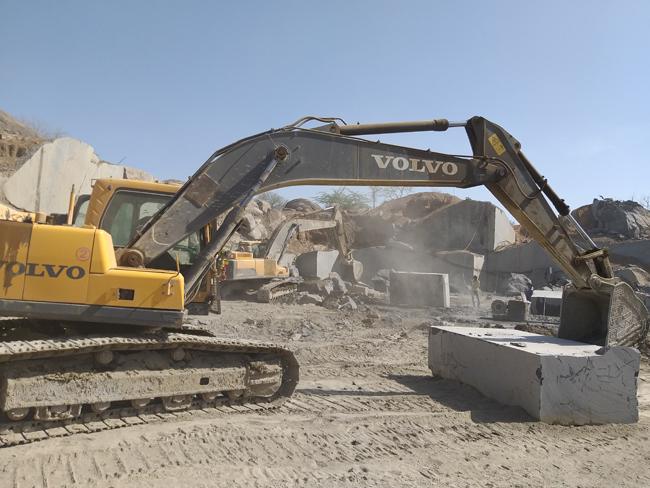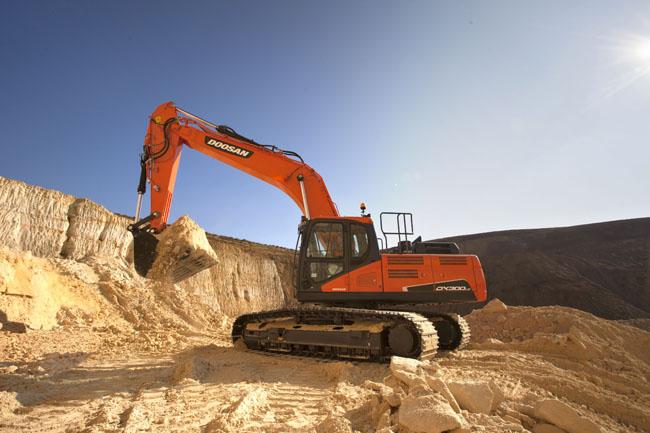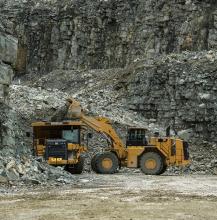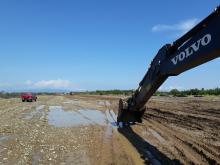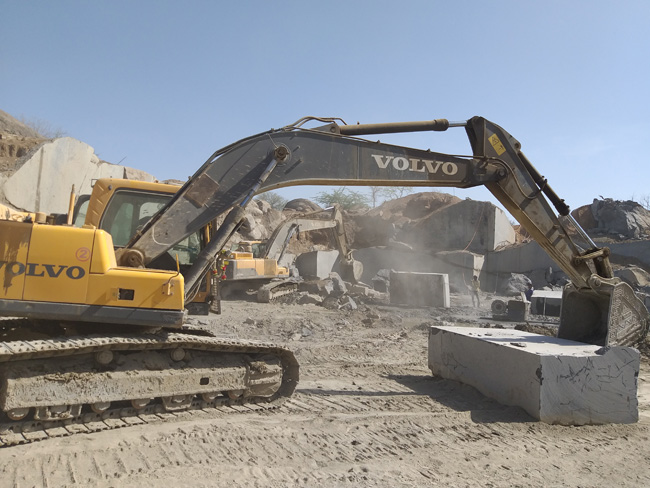
Not many people know or have heard of Chitamba in India, but that all changed in 2008 when a fortune was discovered there — black granite. Since then, Chitamba’s black granite has become much sought-after around the world. Liam McLoughlin reports.
A fleet of machines from
Harsh Granites, a granite supply company based in Jaipur, Rajasthan, has deployed a fleet of 17 machines at the Chitamba mine, where black granite was first found eleven years ago. The fleet consists of Volvo excavator models EC210, EC290, EC380 and EC300DL that work on average between 12 to 13 hours daily. The excavators are primarily used for pushing the granite blocks closer to the towing cranes. The fleet is also used in excavation works and to clear the site.
For example, the EC300DL hauls massive blocks of granites daily — some weighing over 30 tonnes — across considerable distances. It is a huge ask on any machine, especially on its undercarriage, but the Volvo EC300DL goes about its job with ease.
“Only the toughest survive the hardest,” said Amar Singh Bhandari, a partner at Harsh Granites. “The way Volvo EC300DL handles massive blocks of granite —pushing, dragging them with no stress or fuss — is amazing!”
Equipped with a smart electro-hydraulic system, Volvo’s powerful 30 tonne-rated heavy-duty EC300DL provides increased power, digging force, faster cycle times and greater control. The EC300DL is powered by a Volvo D7 engine that has a 170kW power rating and delivers 11% more fuel efficiency compared to previous models. Operators also have the option of using Volvo’s unique ECO mode, which contributes up to 5% of the machine’s total fuel efficiency saving — with no loss of performance in most operating conditions.
“High productivity and low machine downtime delivered by Volvo machines are crucial in our business that is forever facing margin pressures,” Bhandari said. “Operator comfort and optimum fuel consumption are a standard with Volvo machines, and it is easy to see why Volvo is a tough-to-beat choice in mining. Volvo machines remain a clear favourite for Harsh Granites and the group.”
Harsh Granites produces at least 100,000 tonnes of black granites annually, of which 70% are for domestic use, while the remaining 30% are exported to China and Europe.
Scottish company Tillicoultry Quarries has purchased a further three new Volvo CE loading shovels for its quarrying operations spread across Scotland’s central belt and Ayrshire.
This latest package includes two L120H loading shovels complete with 3.5m³ rehandling buckets and boom suspension systems, one of which has been allocated to Tillicoultry’s Northfield quarry in Denny, Falkirk, the other to Tulliallan quarry in Tulliallan, Kincardine-on-Forth. Both will be put in charge of general rehandling and stocking-out duties. A larger Volvo L150H equipped with a 4.2m³ rehandling bucket has been sourced to operate at Hullerhill sand quarry.
These new additions to the fleet are due to the continuing expansion and acquisitions in the central belt locality by Tillicoultry Quarries, according to managing director Wallace Menzies. “The Volvo product represents excellent value for money in terms of economical fuel consumption, high residual values, a proven track record for reliability and sustainability and their qualities and pedigree mirror our own high standards in offering a competitive and professional service,” he says.
Powered by a Tier IV Final Volvo 8-litre engine developing 206hp with a maximum torque of 1317Nm at just 1450rpm, the L120H also benefits from Volvo-designed and -manufactured driveline components devised to offer considerable fuel savings each shift.
All the new Volvo CE machines are fitted with CareTrack as standard, which is Volvo’s telematics system that enables remote monitoring of a wide range of machine functions (e.g. location, fuel consumption, service reminders etc.), thus optimising customer operations.
Doosan says it is introducing new ready kits for its 14-30-tonne range of wheeled and crawler excavators to meet the increasing demand for machine guidance systems from its excavator customers.
The kits can be ordered direct from the company’s factory through Doosan Smart Solutions for use with Leica,
The company adds that its collaboration with the three machine guidance system manufacturers means that customers in Europe can now order excavators pre-installed with Leica, Trimble and Xsite ready kits.
The kits include all the components required to make sure a machine is ready for the installation of a guidance system at a later date, and Doosan says they require very little or no welding, re-painting, drilling or disassembly.
The kits are fitted on customer machines in the Doosan Customisation Centre in the Netherlands.
The 30-tonne DX300LC-5 crawler excavator from Doosan has won the EquipmentWatch Lowest Cost of Ownership (LCO) Award in the Excavators Crawler Medium category for the second year running.
The LCO Awards are based on empirical data regarding the long-term cost of heavy and compact equipment. They are organised by EquipmentWatch, which provides data, software and insights for the heavy equipment industry. Nominees are recognised within 15 different categories of machine that exhibit the lowest cost of ownership over a five-year span.
Doosan says total cost of ownership is one of the most important aspects that buyers take into account when they purchase equipment.
The DX300LC-5 is powered by the Doosan DL08 6-cylinder diesel engine, with an output of 202 kW of power at 1800 rpm, providing a 27% increase in engine power and a 30% boost in torque over the previous LC-3 model. The engine meets Stage IV emission regulations without the need for a diesel particulate filter (DPF), through the use of cooled exhaust gas recirculation (EGR) and selective catalyst reduction (SCR) after-treatment technologies.
As well as the Doosan engine, the DX300LC-5 has features that lead to claimed reductions in fuel consumption that average 10% compared to the Stage IIIB machine. These features include the ‘Trip Meter Setting’ screen which allows operators to check fuel consumption daily (or over a desired period) directly from the control panel.
In a recent post on the Facebook page of German mining company AG für Steinindustrie, board member Cornelius Kirsche wrote: “Is there a more spectacular sight than a 75-ton excavator at work in a lava trench? The latest addition to our portfolio is just a joy to witness. What more is there to add?” In mid-2018, the CASE dealer in Andernach, Germany, supplied AG für Steinindustrie with a CASE CX750D from the company’s latest D-Series range of excavators.
Since then, the machine has been serving the company reliably at the Ochtendung lava plant, located southeast of Kruft in the Fresserhöfe region. AG für Steinindustrie has an excellent pedigree in this region, having conducted mining, processing and shipping operations there since the seventies. The company’s specific operation is to mine lava from the Tönchesberg, one of the volcanic cinder cones that gives the volcanic area of eastern Eifel its distinctive landscape.
The CASE CX750D is used for the direct extraction of raw materials in the lower part of the mines. Volcanic clinker and lava sands are present naturally as loose rock and are separated directly from the mine wall using the machine. After this, the material is loaded onto dump trucks or broken down on site with a mobile crusher to a size that allows for easy processing.
The extreme abrasiveness of the lava material demands high performance from the bucket and arm. In addition, the mining area is criss-crossed with numerous basalt deposits, which, for safety reasons, must be washed away repeatedly in the course of the excavation process.
For this reason, AG für Steinindustrie opted to purchase the Mass Excavator (ME) version of the CASE CX750D, which - with a maximum breakaway force of some 366kN, a larger bucket cylinder and optimised kinematics - is suited for tough extraction jobs.
Hanson UK has bought two new
The two machines were part of a package of 16 awarded to
After a 90-tonne Hitachi machine was moved from one Hanson quarry over to Chipping Sodbury for a trial, HCMUK says that Hanson chose to invest in a new one for the operations at the Chipping Sodbury site. At Shap, the existing 2007 Hitachi ZX870LCR-5 had clocked up 23,000 hours of operations, so the Hanson team decided it was time to replace it with the latest model from this weight class – the ZX890LCR-6.
Hanson UK is a supplier of heavy building materials/aggregates to the construction industry. Shap Beck quarry and Chipping Sodbury quarry produce limestone aggregate, some of which is used in the large-scale production of lime for steelmaking.

